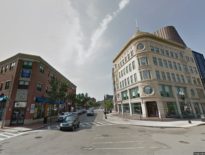Gov. Charlie Baker’s proposal to make zoning changes easier at the local level is one step closer to passage after the Housing Committee voted to advance it alongside 20 other bills aimed at generating new housing production.
The Housing Committee voted 16-1 in a poll that concluded Thursday afternoon to favorably report out Baker’s bill (H.3507), according to a copy of the results acquired by the News Service.
All 20 other bills, which range from a proposal to establish a housing production task force to one that would set a statewide housing production goal, also advanced with only one dissenting vote. Rep. David DeCoste, a Norwell Republican voted against each bill, while Sen. Patrick O’Connor, a Plymouth Republican, reserved his rights on some votes.
Sen. Brendan Crighton, the committee’s co-chair, told the News Service he expects the bills to be a priority in 2020 to address a housing crisis stretching across most of the state.
“We’re producing less than half the housing we produced during the 1970s. Rent has increased more than 75 percent since 2000,” Crighton said. “Everyone agrees we’re not producing nearly the amount of housing we need to, and as a result, Massachusetts has become an unaffordable place to live. I’m seeing it in my district and seeing from all of my colleagues that they’re being affected as well.”
In a statement, Senate President Karen Spilka did not say if she would bring Baker’s bill or any of the other bills to the floor for a vote in 2020, but said the topic is high on the agenda.
“Tackling our housing challenges remains a priority for the Senate, and so I’m excited to see movement on this issue,” Spilka said in a statement. “I am proud of the Senate’s history of leading on expanding access and affordability in our housing sector. I look forward to working with Senate Chair of Housing Senator Brendan Crighton, as well as the members, to address this topic once again.”
Baker originally filed his legislation, referred to by supporters as the “housing choice bill,” in December 2017.
The legislation would lower the local voting threshold needed for zoning changes from a two-thirds majority to a simple majority, a difference that Baker and supporters argue would allow more projects to get approved rather than fail on a 3-2 city council vote or with only 55 percent backing.
Some opponents argued the change could lead to a spike in density that alters the character of local neighborhoods, but Crighton disagreed.
“It doesn’t take away any local control,” he said. “It just puts together a more common-sense approach that says a majority of folks can make a decision on the matter.”
Lawmakers did not get Baker’s bill across the finish line last session, and the administration ramped up its advocacy this year with regular events pushing it as a much-needed tool to address a suffocating housing crunch.
Seven months after the committee heard testimony – and two months after co-chair Rep. Kevin Honan said more work was needed to get stakeholders concerned about density on board – Baker’s bill advanced almost unanimously.
“The Baker-Polito Administration is committed to addressing the commonwealth’s housing crisis and since taking office has invested more than $1 billion in affordable housing, signed the largest housing bond bill in Massachusetts history and was pleased to re-file An Act to Promote Housing Choices earlier this year,” Baker spokeswoman Anisha Chakrabarti said in a statement. “Our administration and the broad and diverse group of supporters behind this legislation remain committed to passing H.3507 and will carefully review final legislation that comes to the governor’s desk.”
A spokesperson for House Speaker Robert DeLeo did not respond to a News Service inquiry about whether he plans to bring the housing bills up for full votes in the new year.
In addition to Baker’s bill, the committee voted to advance 20 other pieces of legislation.
One bill among those backed by the committee (H.1318), filed by Cambridge Rep. David Rogers, would establish a target that Massachusetts develop 427,000 new units of housing by 2040. Under the proposal, 85,400 would need to be affordable to households who earn less than 80 percent of area median income and 8,500 would need to be affordable for residents earning less than 30 percent of area median income.
Another proposal (H.1325) would create a new legislative task force to study housing production and make recommendations, while bills also aim to increase permissible residential density (H.1299), offer grants for community-scale development (H.1290) and more.
A bill filed by Honan and Rep. Andres Vargas that advanced Thursday combines language found in several other bills. The bill (H.1288) includes voting-threshold changes similar to Baker’s and also calls for production of 427,000 new units by 2040, albeit with a further requirement for multi-family housing by right in MBTA communities. A new analysis by the Massachusetts Housing Partnership shows that Greater Boston could accommodate 253,000 new units of housing if areas within a half-mile of a commuter rail or subway stop were moderately densified.




 |
| 

